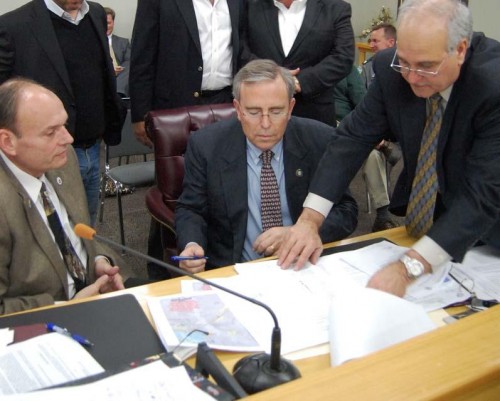
T’bonne levee district inks LDWF agreement for J-2
February 23, 2010
A day in a soldier’s life
February 25, 2010One of my favorite stories from Anthony de Mello’s “Song of the Birds” features a rich industrialist who was disturbed to find a fisherman sitting lazily beside his boat. “Why aren’t you out there fishing?” he asked.
“Because I’ve caught enough fish for today,” said the fisherman.
“Why don’t you catch more fish than you need?” the rich man asked.
“What would I do with them?”
“You could earn more money,” came the impatient reply, “and buy a better boat so you could go deeper and catch more fish. You could purchase nylon nets, catch even more fish, and make more money. Soon, you would have a fleet of boats and be rich like me.”
The fisherman asked, “Then what would I do?”
“You could sit and enjoy life,” said the industrialist.
The fisherman said, “What do you think I’m doing right now?”
Sometimes we get our priorities mixed up. We think riches will bring us happiness. We keep working hard to acquire more things and fail to appreciate the beauty of all God’s creation. We can also fail to develop the essential relationship in our lives with God, family and friends.
The season of Lent gives us a time to stop, reflect and change. We all need to change our self-centeredness to caring for others. We need to change our tendency to worry about “what’s in it for me” to how can I help those in need. We need to change our tendency to have and buy things to taking responsibility for others and the world in which we live.
We need to change our attitudes of promoting war to promoting peace; from destruction of the Earth to reverencing God’s creation; from despair to hope; from fear to faith; from self-hate to self-love. This includes the sinful things we do and our sins of omission.
This type of conversion does not usually take place by doing the same thing we did last year. To be the persons God wants us to be, our conversion must begin from within. Conversion is difficult. It involves making God the center of our lives, to recognize God’s grace in our lives, in others and in the world in which we live.
We all have a deep spiritual hunger inside us. St. Augustine reminded us many years ago, “You (God) have formed us for yourself, and our hearts are restless till they find rest in you.”
When we try to fill our spiritual centers with substances, material things, accomplishments, events, other people, or our own egos, we eventually begin to feel empty. Things and addictions can satisfy us for a while, but eventually we find that God alone can fill our deepest longings. At the heart of conversion is our willingness to allow God to be God in our lives.
Aesop’s fable about the race between the Tortoise and the Hare is right on target. Slow and steady wins the race every time. It’s not glamorous, but it’s true. Change does not come easily and swiftly. We must decide to change constantly, moment by moment.
An important part of the spiritual life is to unmask the illusions we have about ourselves and our society. We have to confront our blindness. We all have blind spots in our lives. Jesus told us that we can easily see the sins of others versus seeing our own.
Lent is a time to look at our “blind spots” and ask “What do I need to change in my life? What steps do I need to take to make these changes?” These steps should be our “penances” for Lent. Take it slow and easy and allow God’s Spirit to make the changes you need now in your life.
Have a Blessed Lent!






